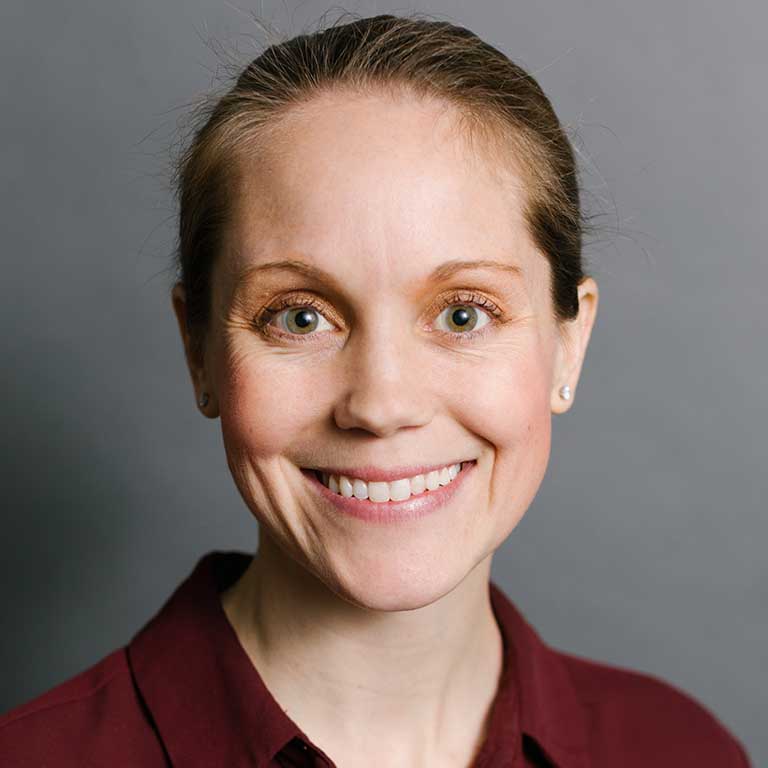- Ph.D., Psychological Sciences, Vanderbilt University, 2015
- B.A., Psychology, University of Notre Dame, 2010

Emily Fyfe
Associate Professor, Psychological and Brain Sciences
Director of Pedagogy
**Reviewing graduate applications for Fall 2026**

Associate Professor, Psychological and Brain Sciences
Director of Pedagogy
**Reviewing graduate applications for Fall 2026**
Children are continuously learning as they observe and interact with people and the world. To that end, my research is in the area of cognitive development and the science of learning more broadly, with an emphasis on how children think, learn, and solve problems in mathematics. My goals are to characterize changes in children’s knowledge over time and to evaluate the effects of formal and informal learning experiences. I use an interdisciplinary approach that capitalizes on perspectives from developmental psychology, cognitive science, and mathematics education. I typically conduct behavioral experiments in which I manipulate one aspect of the learning environment and examine its causal impact on target learning outcomes. I also track changes over time and conduct error analyses to examine the development of children’s misconceptions.
Overall, my aim is to better understand how the learner and the learning environment interact to produce positive changes, especially in mathematics. My research on the science of learning not only helps identify basic cognitive processes that support the construction of knowledge, but also examines how to use that information to design effective instructional techniques.
1. Borriello, G. A., Grenell, A., Vest, N., Moore, K., & Fyfe, E. R. (2022). Links between repeating and growing pattern knowledge and math outcomes in children and adults. Child Development, 94, e103-e118. doi:10.1111/cdev.13882
2. Fyfe, E. R., Borriello, G. A., & Merrick, M. (2022). A developmental perspective on feedback: How corrective feedback influences children’s literacy, mathematics, and problem solving. Educational Psychologist. doi:10.1080/00461520.2022.2108426
3. Motz, B. A., Fyfe, E. R., & UGuba, T. P. (2022). Learning to call bullsh*t: Categorization training improves critical thinking performance. Journal of Applied Research in Memory and Cognition. doi:10.1037/mac0000053
4. Donovan, A. M., & Fyfe, E. R. (2022). Connecting concrete objects and abstract symbols promotes children’s place value knowledge. Educational Psychology, 42, 1008-1026, doi:10.1080/01443410.2022.2077915
5. Fyfe, E. R., Byers, C., & Nelson, L, J., & (2022). The benefits of a metacognitive lesson on children’s understanding of mathematical equivalence, arithmetic, and place value. Journal of Educational Psychology, 114, 1292-1306. doi:10.1037/edu0000715
6. Vest, N. A., Fagan, S. E., & Fyfe, E. R. (2022). The role of gesture and mimicry for children’s pattern learning. Cognitive Development, 63, 101196. doi:10.1016/j.cogdev.2022.101196
7. Grenell, A., Gardner, B., Nelson, L. J., & Fyfe, E. R. (2022). Children’s confidence using incorrect strategies on mathematical equivalence problems. Cognitive Development, 62, 101167, doi:10.1016/j.cogdev.2022.101167.
8. De Leeuw, J. R., Motz, B., Fyfe, E. R., Carvalho, P. F., & Goldstone, R. (2022). Generalizability, transferability, and the practice-to-practice gap. Commentary in response to T. Yarkoni, The Generalizability Crisis. Behavioral and Brain Sciences, 45, E11. doi:10.1017/S0140525X21000406
9. Borriello, G. A., Flynn, M. E., & Fyfe, E. R. (2022). Developmental differences in children’s and adults’ strategies on a repeating pattern task. Early Childhood Research Quarterly, 59, 300-310. doi:10.1016/j.ecresq.2021.12.012
10. Fyfe, E. R., de Leeuw, J. R., Carvalho, P. F., Goldstone, R. L., Sherman, J., … & Motz, B. (2021). ManyClasses 1: Assessing the generalizable effect of immediate versus delayed feedback across many college classes. Advances in Methods and Practices in Psychological Science, 4, 1-24. doi:10.1177/25152459211027575
11. Vest, N. A., Fyfe, E. R., Nathan, M. J., & Alibali, M. W. (2020). Learning from an avatar video instructor: The role of gesture mimicry. Gesture, 19, 128-155. doi:10.1075/gest.18019.ves
12. Fyfe, E. R., Matthews, P. G., & Amsel, E. (2020). College developmental math students’ knowledge of the equal sign. Educational Studies in Mathematics, 104, 65-85. doi:10.1007/s10649-020-09947-2.
13. Fyfe, E. R., & Brown, S. A. (2020). This is easy, you can do it! Feedback during mathematics problem solving is more beneficial when students expect to succeed. Instructional Science, 48, 23-44. doi:10.1007/s11251-019-09501-5
14. Flynn, M. E., Guba, T. P., & Fyfe, E. R. (2020). ABBABB or 1212: Abstract language facilitates children’s early patterning skills. Journal of Experimental Child Psychology, 193, 104791. doi:10.1016/j.jecp.2019.104791
15. Nelson, L. J., & Fyfe, E. R. (2019). Metacognitive monitoring and help-seeking decisions on mathematical equivalence problems. Metacognition and Learning, 14, 167-187. doi:10.1007/s11409-019-09203-w
16. Fyfe, E. R., Matz, L., Hunt, K., & Alibali, M. W. (2019). Mathematical thinking in children with Developmental Language Disorder: The roles of pattern skills and verbal working memory. Journal of Communication Disorders, 77, 17-30. doi:10.1016/j.jcomdis.2018.11.001
17. Fyfe, E. R., Rittle-Johnson, & Farran, D. C. (2019). Predicting success on high-stakes math tests from preschool math measures among children from low-income homes. Journal of Educational Psychology, 111, 402-413. doi:10.1037/edu0000298
18. Fyfe, E. R., & Nathan, M. J. (2019). Making “concreteness fading” more concrete as a theory of instruction for promoting transfer. Educational Review, 71, 403-422. doi:10.1080/00131911.2018.1424116
19. Fyfe, E. R., & Brown, S. A. (2018). Feedback influences children’s reasoning about math equivalence: A meta-analytic review. Thinking and Reasoning, 24, 157-178. doi:10.1080/13546783.2017.1359208
20. Fyfe, E. R., Matthews, P. G., Amsel, E., McEldoon, K. L., & McNeil, N. M. (2018). Assessing formal knowledge of math equivalence among algebra and pre-algebra students. Journal of Educational Psychology, 110, 87-101. doi:10.1037/edu0000208